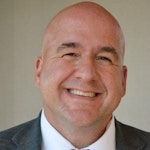Tire dealers who aren’t offering advanced driver assistance system (ADAS) calibrations are missing out on extra revenue — and a few other things.
That’s the opinion of Hugh Boeset, who owns five Midas locations in the Chicago, Ill., area.
Two of those stores are generating significant, add-on income by providing ADAS calibrations, using vehicle alignments as an entry point.
“When I look at my best shop that’s doing ADAS, its revenue on alignments is up 52% versus the prior year” — all incremental earnings enabled by ADAS service, according to Boeset.
New to ADAS
Boeset is new to ADAS. He first installed ADAS calibration equipment at his Boling Brook, Ill., store in October 2023 and followed that by installing ADAS equipment at his Naperville, Ill., location a few months later.
“When I first started looking at offering this service in 2022, I believe less than 30% of vehicles had ADAS,” he says.
Boeset has working relationships with several local body shops, some of which were starting to invest in ADAS equipment at the time.
As he observed their success, “I thought, ‘Maybe there’s something here that’s worth looking at?’”
He began shopping for ADAS equipment, initially looking at “portable units that you could move from bay to bay and shop to shop.”
He ultimately chose Autel’s MaxiSYS IA900WA Wheel Alignment and ADAS calibration system, which he describes as an “all-in-one" set-up.
“I probably invested $35,000 to $36,000 per shop,” which he says was not much more than the cost of a new, standalone alignment machine.
Technician training, which turned out to be less complex than Boeset expected, came next.
He discovered that ADAS calibration is a “step-by-step" process that doesn’t allow for deviation. All that’s required is a technician “who can follow directions consistently,” without taking shortcuts.
With equipment and trained techs in place, Boeset then began marketing the service.
He started by talking with smaller body shops in his area that didn’t have “the wherewithal to do alignments and ADAS calibrations” — a process that continues today.
“We visit with them and educate them on opportunities to work with us. And through our CRM program, we communicate with our existing (retail) customers.
“We also do a lot of qualifying of customers when they come in for service,” he says. “We immediately identify which vehicles could require calibration. We tell them why it’s necessary and the fact we have the ability to do it.
“I think anybody who’s bought a vehicle in the last three years has a good grasp of what ADAS is and what it does, especially rear radar (and) adaptive cruise control — things that are safety-related.
“Consumers know they have ADAS. But they don’t necessarily grasp the relationship of ADAS to services like alignments.”
Boeset and his techs make sure that the alignment-to-ADAS transition is seamless. “We go from an alignment directly into a calibration without any hiccups," he notes.
The customer’s car “is already on the rack. It’s already set up.”
‘More standardized’
ADAS service is here to stay, according to Boeset. “It’s an opportunity to provide a service that’s becoming more standardized on vehicles. The other thing is that it can be a very profitable service. The revenue is there.”
The ability to provide ADAS service also keeps business in-house, instead of sending clients elsewhere. “We want to be a one-stop shop for all of our customers’ needs.”
Another important benefit, he says, is the reassurance provided to customers that their vehicles are in safe working order, with all ADAS engaged and ready to perform intended functions.
“You’re doing your customer a disservice if you aren’t providing ADAS calibrations.”




